This fired-up track by The Boo Radleys was released 20 years ago in October 1998. Reaching number 54 in the UK charts, this was to be the Liverpool band's final single. Rampant electronics do battle with savage guitars and a hectic, full-throated vocal on this song that should've got a lot higher in the charts.
When I first heard this on (Radio 1 show) The Evening Session in 1998, I was thrilled by it and surprised by the band's new sound, which couldn't have been further from what I would've expected from them at the time. Up until then I was only aware of their unavoidable 1995 summer smash hit 'Wake Up Boo'. Before that, they were acclaimed in alternative scene circles for their psychedelic shoegaze sounds after forming in the late 80s. The unstoppable wave of Britpop coincided with the release of the release of the joyous 'Wake Up Boo', which became a radio staple and stayed in the charts for ages. With its bright, bouncy optimism, fanfare horns and rise and shine lyrics, their big pop hit overshadowed everything the band followed it with.
The big hit and it's accompanying album were followed the next year with the loud, messy, weird 'C'mon Kids', seen my many as a deliberate attempt to distance themselves from the lingering memory of 'Wake Up Boo'. The album sold poorly, while the most successful single from it could only just about scrape into the Top 20. "We didn't want to scare away the hit-kids, we wanted to take them with us to somewhere that we'd not been before" claims singer Sice (real name Simon Rowbottom). "All we wanted to do was try something new - to keep ourselves fresh and interested". Learning a lesson in how a huge hit single can set you back artistically, they soon found themselves in a position where some of the indie scene saw them as sell-outs who had lost their edge. Meanwhile, the mainstream pop audience couldn't care less about their other less commercial material. It's correct to say that their audience had become limited.
Finding themselves "back on the indie scrapheap" while labelmates Oasis were ruling the world, the band seemed to resign themselves to the fact that it was all downhill from there. With songwriter Martin Carr remembering the period as an uninspired time, and Sice quoting that they had "lost interest once a goal had been achieved", The Boo Radleys were at a low ebb when they recorded 'Kingsize", and their hearts weren't in it anymore.
Finding themselves "back on the indie scrapheap" while labelmates Oasis were ruling the world, the band seemed to resign themselves to the fact that it was all downhill from there. With songwriter Martin Carr remembering the period as an uninspired time, and Sice quoting that they had "lost interest once a goal had been achieved", The Boo Radleys were at a low ebb when they recorded 'Kingsize", and their hearts weren't in it anymore.
Incredibly, and despite all this, it resulted in what many including myself regard as their finest album, one of the most underrated records of the decade, and something that stands as one of the most sad, emotional and tune-packed farewells in musical history. With a more simplified songwriting approach, orchestral indie rock brilliance is imbued with a wondrous sense of introspection and resignation that is hugely endearing. Upon hearing it for the first time, I thought that once more singles were released from Kingsize, they would surely rise well above their perceived status as "one hit wonders". No further singles were released, and after appearing quietly on the shelves on 19 October 1998, the album flopped at number 62 in the charts. The group announced their split a few months later.
A complete lack of support from the industry sank one of the most magnificent records of the 90s. Creation boss Alan McGee allegedly reckoned that the album had no appeal, asking the band "who exactly is going to buy this?" After being ordered to go back to the studio and record two singles to salvage the LP with, the band came back with the terrific 'Free Huey', which found civil rights era-funk flavours welded to supercharged breakbeats and riotous guitars. Back in 1998, Carr said "When you come back after a year-and-a-half you don't want to knock on the door all apologetic saying, 'Can we come back to the party please?' You want to barge in shouting, 'Where's the keg?" The track was reportedly inspired by Norman Cook's remix of Wildchild's 'Renegade Master', a single released earlier that year.
A complete red herring that proved to be completely at odds with the rest of the LP, there's an argument that such a contrasting track has a perfect place on the album to give the overall picture a brief burst of energy. A question to raise is why were they singing about activist and Black Panther co-founder Huey Newton in 1998? Did they feel like prisoners in the music industry? Was it a veiled stab at Creation Records? Were they annoyed with the label's lack of support and their unwillingness to promote their music properly? "we're told to run towards the future while standing on our feet, and be content with the scraps that they throw us after promising a feast"
While I fully understand (and agree with) criticisms that 'Free Huey''s main lyrical hook is repeated far more times than necessary, this single still sounds utterly exhilarating 20 years later. Unknown by many, unloved by some, but one of my favourite singles of 1998.
Next week I will be revisiting the stunning 'Kingsize' in full.






Comments
Post a Comment